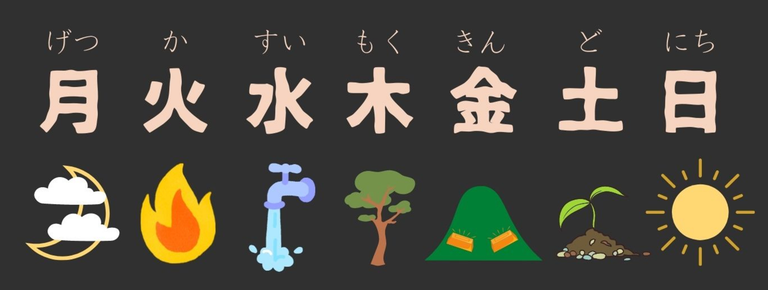
The other day I posted about the origins of the names of the days of the week in English and why we have seven day weeks. If you missed it, go read that post. In short, the Babylonians decided on seven named days to match the seven visible "planets" (including the moon and sun), the Romans adopted this system and then because of the Roman Empire the Roman names for these days spread everywhere, including the Norse speaking countries which renamed them and from which is where the English names for the days came from. If that in short is too confusing, go read the post.
Now in this post let's look at Japan.
Now before the Edo period (1603-1868), Japan had no concept of the week. The closest they got was dividing the month into 3 jun, periods of 10 days. These were shojun 初旬 "early ten", chūjun 中旬 "middle ten", and gejun 下旬 "late ten". These weren't really used the same as we use weeks today, but I suppose you could think of this as an early idea of the week. Japan still uses these groupings today in many contexts.
Anyway, sometime before the Edo period, China adopted the seven-day week from Central Asia, which had already borrowed it from the Roman Empire long before. China took the days and assigned them new names based on the elements they associated with the planets that the days were originally named after. This system then moved to Japan where these Chinese names were borrowed as:
- 日曜日 (nichiyōbi) — Sunday, for the Sun (日), literally sun day, same as English.
- 月曜日 (getsuyōbi) — Monday, for the Moon (月), lit moon day, again same as English.
- 火曜日 (kayōbi) — Tuesday, for Mars (火), lit fire day. In China, Mars was seen as a fiery, red planet, making it fit well with the element fire. This lines up nicely with the Western mythology for the god Mars.
- 水曜日 (suiyōbi) — Wednesday, for Mercury (水), associated with water. Why water? Mercury has the fastest orbit and also seemingly changes directions from our viewpoint, making it appear to the ancient Chinese as fast and changeable. This reminded them of water which embodies adaptability, fluidity, and intelligence. Hmm... water almost makes more sense than a god with winged boots who moved really fast like the West pictured from those traits. The metal mercury flows like water, so that is a nice match too!
- 木曜日 (mokuyōbi) — Thursday, for Jupiter (木), associated with wood. In Chinese thought, wood represents growth, expansion, and vitality—fitting qualities for the largest planet. Wood also symbolizes spring and development, which aligns well with the god Jupiter’s status as a symbol of benevolence and growth.
- 金曜日 (kin’yōbi) — Friday, for Venus (金), associated with metal (gold). The reasoning behind Venus’s association with Metal is less certain. It is theorized that it could be due to Venus's appearance in the evening sky. Also, Venus is a constant and prominent feature in the sky, and this may have been connected with the idea of loyalty and righteousness. All of these fit well with their idea of the element metal which is valued for qualities like precision, clarity, and resilience. This one doesn't line up especially well with the Western idea of Venus, but we can give it a nice mnemonic and say Venus loves gold.
- 土曜日 (doyōbi) — Saturday, for Saturn (土), associated with earth. Saturn's slow movement gave it the association of discipline and limits, making the planet fit well with the element earth which embodies the sustaining, grounded aspects of life. These are all things that align well with Saturn (or Chronos), making this a fitting match.
So there we go. You can see that China maintained the planet connections, but added in their own element idea for each planet, which coincidently does match pretty well with the Western images of the planets in most cases. Like so much cross cultural history, this one is a fascinating blend, merging Roman astronomical influences with East Asian philosophical symbolism.
Incidentally, in addition to the system of ten-day periods (jun) mentioned above and the normal seven-day week, Japan also follows a six-day lucky calendar. This one is mainly just for fun and not official purposes like the first two, but it does have some influence, especially for the most lucky day of the loop. I won't cover this here, but see my post on the rokuyo for more info.

So just to sum up this and the last post. Why does the world follow a seven day week and only have seven named days in a constantly repeating loop? Blame the ancient Babylonians whose system spread to the world thanks to the Roman Empire.
❦
 |
David LaSpina is an American photographer and translator lost in Japan, trying to capture the beauty of this country one photo at a time and searching for the perfect haiku. He blogs here and at laspina.org. Write him on Twitter or Mastodon. |